一般将来时知识点及练习
(完整版)一般将来时态讲解及练习和答案
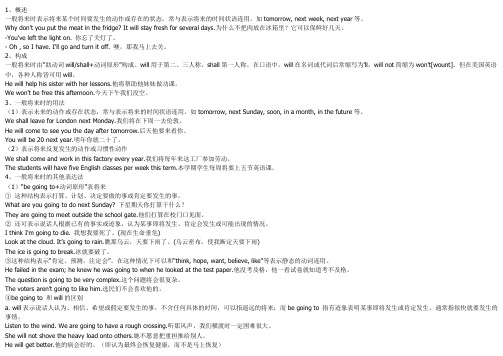
1、概述一般将来时表示将来某个时间要发生的动作或存在的状态,常与表示将来的时间状语连用,如tomorrow, next week, next year等。
Why don’t you put the meat in the fridge? It will stay fresh for several days.为什么不把肉放在冰箱里?它可以保鲜好几天。
-You've left the light on. 你忘了关灯了。
- Oh , so I have. I'll go and turn it off. 噢,那我马上去关。
2、构成一般将来时由“助动词will/shall+动词原形”构成。
will用于第二、三人称,shall第一人称。
在口语中,will在名词或代词后常缩写为'll,will not简缩为won’t[wount]。
但在美国英语中,各种人称皆可用will。
He will help his sister with her lessons.他将帮助他妹妹做功课。
We won't be free this afternoon.今天下午我们没空。
3、一般将来时的用法(1)表示未来的动作或存在状态,常与表示将来的时间状语连用,如tomorrow, next Sunday, soon, in a month, in the future等。
We shall leave for London next Monday.我们将在下周一去伦敦。
He will come to see you the day after tomorrow.后天他要来看你。
You will be 20 next year.明年你就二十了。
(2)表示将来反复发生的动作或习惯性动作We shall come and work in this factory every year.我们将每年来这工厂参加劳动。
一般将来时讲解及练习(含答案)
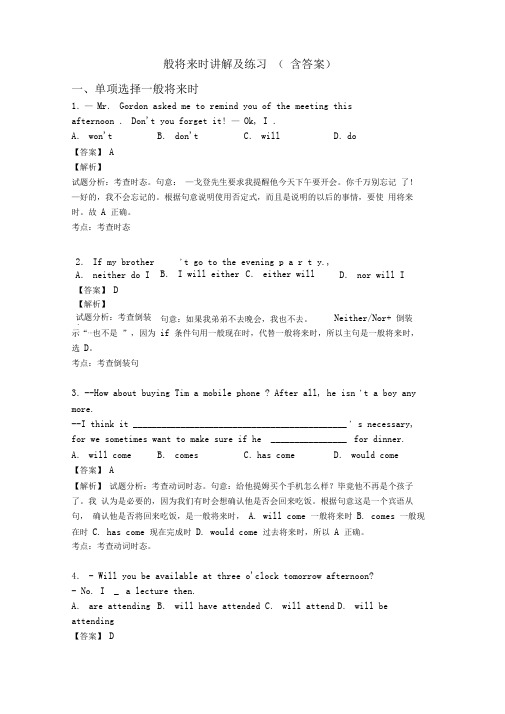
般将来时讲解及练习(含答案)一、单项选择一般将来时1.—Mr.Gordon asked me to remind you of the meeting thisafternoon .Don't you forget it! —Ok, I .A.won't B.don't C.will D.do【答案】A【解析】试题分析:考查时态。
句意:—戈登先生要求我提醒他今天下午要开会。
你千万别忘记了!—好的,我不会忘记的。
根据句意说明使用否定式,而且是说明的以后的事情,要使用将来时。
故A 正确。
考点:考查时态2.If my brother doesn 't go to the evening p a r t y.,A.neither do I B.I will either C.either willI D.nor will I【答案】D 【解析】试题分析:考查倒装句:句意:如果我弟弟不去晚会,我也不去。
Neither/Nor+ 倒装句,表示“⋯也不是”,因为if 条件句用一般现在时,代替一般将来时,所以主句是一般将来时,选D。
考点:考查倒装句3.--How about buying Tim a mobile phone ? After all, he isn 't a boy any more.--I think it _____________________________________________ ' s necessary, for we sometimes want to make sure if he ________________ for dinner. A.will come B.comes C.has come D.would come【答案】A【解析】试题分析:考查动词时态。
句意:给他提姆买个手机怎么样?毕竟他不再是个孩子了。
我认为是必要的,因为我们有时会想确认他是否会回来吃饭。
英语一般将来时X知识点总结及经典习题(含答案)含答案解析百度文库
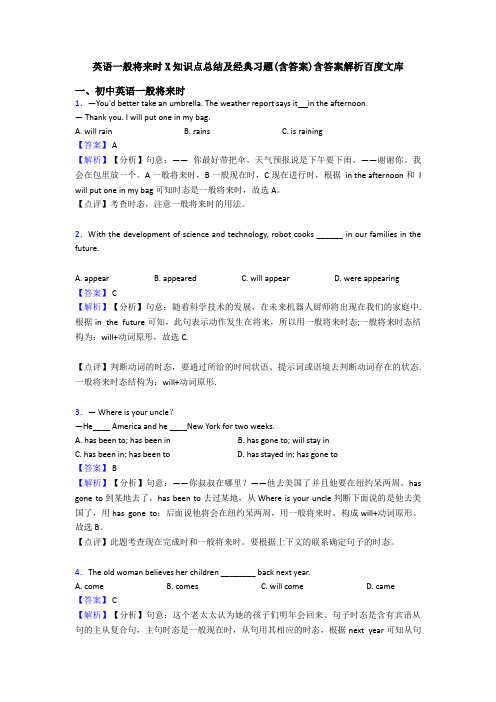
英语一般将来时X知识点总结及经典习题(含答案)含答案解析百度文库一、初中英语一般将来时1.—You'd better take an umbrella. The weather report says it in the afternoon.— Thank you. I will put one in my bag.A. will rainB. rainsC. is raining【答案】 A【解析】【分析】句意:——你最好带把伞。
天气预报说是下午要下雨。
——谢谢你。
我会在包里放一个。
A一般将来时,B一般现在时,C现在进行时,根据 in the afternoon和 I will put one in my bag 可知时态是一般将来时,故选A。
【点评】考查时态,注意一般将来时的用法。
2.With the development of science and technology, robot cooks ______ in our families in the future.A. appearB. appearedC. will appearD. were appearing【答案】 C【解析】【分析】句意:随着科学技术的发展,在未来机器人厨师将出现在我们的家庭中. 根据in the future可知,此句表示动作发生在将来,所以用一般将来时态;一般将来时态结构为:will+动词原形,故选C.【点评】判断动词的时态,要通过所给的时间状语、提示词或语境去判断动词存在的状态. 一般将来时态结构为:will+动词原形.3.— Where is your uncle?—He____ America and he ____New York for two weeks.A. has been to; has been inB. has gone to; will stay inC. has been in; has been toD. has stayed in; has gone to【答案】 B【解析】【分析】句意:——你叔叔在哪里?——他去美国了并且他要在纽约呆两周。
一般将来时-知识点归纳与练习

一般将来时-知识点归纳与练习一、一般将来时1.—Do you know ______?—The day after tomorrow.A. when we visited the museumB. when we will visit the museumC. when did we visit the museumD. when will we visit the museum【答案】 B【解析】【分析】句意:——你知道我们什么时候参过博物馆吗?——后天。
Do you know 后接宾语从句,应使用陈述结构,因此排除C和D,根据答语The day after tomorrow.可知问句使用一般将来时,故答案是B。
【点评】考查宾语从句的语序各时态,注意宾语从句使用陈述语序,根据答语确定问句的时态。
2.— I hear your father has gone to Tokyo on business?— Yes. And he _______ in three weeks.A. has returnedB. will returnC. would returnD. returns【答案】 B【解析】【分析】句意:—我听说你父亲出差去日本了?—是的。
他将在三周后回来。
时间状语in three weeks与一般将来时连用,故选B。
3.I’m so lucky because I see more cartoon characters next month.A. is able toB. will be able toC. be able toD. was able to【答案】B【解析】【分析】句意:我真幸运因为我下个月能看到更多的卡通人物。
next month表将来,因此用will be able to。
故选B。
【点评】考查一般将来时。
4.—Do you know when Mrs. White for dinner this evening?—No, but I think she when she is free.A. will come; will comeB. will come; comesC. comes; will come【答案】 A【解析】【分析】句意:——你知道怀特太太今晚是否来吃晚饭吗?——不知道。
一般将来时-知识点归纳与练习经典

一般将来时-知识点归纳与练习经典一、一般将来时1.—Could you tell me_______?—In five minutes, at 10: 25.A. when did the next underground arriveB. when the next underground arrivedC. when will the next underground arriveD. when the next underground will arrive【答案】D【解析】【分析】句意:—你能告诉我下一个地铁什么时候到吗?—五分钟后,10点25分。
tell后跟宾语从句,宾语从句需用陈述句语序,A、C两项都是疑问句语序,可排除。
根据答语In five minutes,结合句意语境,可知还没有到站,需用一般将来时态,故答案选D。
【点评】考查宾语从句。
根据语境确定宾语从句的时态,注意陈述语序。
2.— Excuse me. Could you tell me ?— It will leave at 4:00 p.m.A. how will you go to ShanghaiB. how you will go to ShanghaiC. when the bus would leave for ShanghaiD. when the bus will leave for Shanghai【答案】 D【解析】【分析】这是一道根据回答写出问句所缺成分的题目,阅题时要仔细分析回答的句子。
句意:打扰一下,你能告诉我这辆公交车什么时候动身前往上海吗?它将会在下午4点的时候离开。
据回答知问句问的是时间,故排除A和B。
由题知,句子是一般将来时,故问句中也要用一般将来时态。
故选D。
【点评】本题需要考生根据回答反推问题,在阅题时要仔细审题。
3.I _________ the shops. Can I get you anything?A. go toB. went toC. have gone toD. am going to【答案】 D【解析】【分析】句意:我将去商店,我可以给你买一些东西吗迭项八是一般现在时,表示经常性的行为或状态;选项B是一般过去时,表示动作发生在过去,和现在没有关系;选项C 是现在完成时,表示过去发生的动作对现在造成的影响或结果。
【英语】一般将来时-知识点归纳与练习(word)

【英语】一般将来时-知识点归纳与练习(word)一、一般将来时1.- Do you have any plans for tonight?- Yes, I at the new Italian restaurant in town.A. eatB. have eatenC. ateD. am going to eat【答案】 D【解析】【分析】句意:——你今晚有什么计划吗? ——是的, 我打算在镇上新开的意大利饭馆吃饭。
根据句中的时间词“tonight”判断此句应是一般将来时, 结构:am/is/are+ going to do; will do.故直接选D即可。
【点评】一般将来时2.I don't know if he _____ tomorrow. If he _____, I'll go to see him.A. leaves; gets upB. will go; will goC. will come; comesD. is arriving; leaves【答案】 C【解析】【分析】我不知道明天他是否会来。
如果他来了,我会去看他。
结合语境可知前文是宾语从句,根据时间状语可知从句中描述的是将来的动作,故用一般将来时态。
下文是条件状语从句,当主句描述将来动作时,条件状语从句中用一般现在时态表示将来的动作,故选C。
【点评】英语宾语从句的时态和主句没有必然的联系,需结合语境进行具体分析。
而英语状语从句的时态与主句有比较紧密的联系,若主句为一般将来时,时间和条件状语从句通常要用一般现在时表示将来,而不能直接使用将来时态。
3.We ________ a party for Kate. It's supposed to be a surprise.A. were havingB. hadC. will haveD. have had【答案】C【解析】【分析】句意:我们将为凯特举办一个聚会。
英语一般将来时课堂语法笔记+习题(含答案)

一般将来时(The Simple Future tense)课堂语法笔记及习题一、概念及用法。
1. 表示将要发生的动作或存在的状态(will do)。
e.g. He will visit our school in half an hour.He will be very happy if he receives many gifts.2. 表示计划或打算做某事(be going to do)。
e.g. He is going to do his homework this afternoon.二、基本结构。
1. will do结构肯定句:主语+ will + 动词原形+ 其他. I will go and buy some beef.否定句:主语+ will + not(won't) + 动词原形+ 其他. I won't go and buy some beef.一般疑问句:Will +主语+动词原形+ 其他? Will you go and buy some beef?2. be going to do结构肯定句:主语+ be going to + 动词原形+ 其他. He is going to see a film tomorrow.否定句:主语+ be + not + going to + 动词原形+ 其他. He isn't going to see a film tomorrow. 一般疑问句:Be + 主语+ going to + 动词原形+ 其他. Is he going to see a film tomorrow? 三、标志词(时间状语)(一秒识别时态)tomorrow 明天, tonight今晚, the day after tomorrow后,next week (month, year …)下一周(月、年), this afternoon, evening …这个下午、晚上, soon不久、很快, in 2050 在2050年, in + 时间段(例如:in 5 years )5年后等。
最新一般将来时知识点总结及经典习题(含答案)经典

最新一般将来时知识点总结及经典习题(含答案)经典一、一般将来时1.— I hear Leo will leave for Korea for a meeting.— Really? Do you know when he _______.A. will startB. to startC. started【答案】 A【解析】【分析】句意:——我听说Leo要去韩国开会。
——真的吗?你知道他什么时候出发吗?when何时,此处询问将来的时间,故用一般将来时,因此选A。
【点评】考查动词的时态。
2.— Let's go fishing if it this weekend.— But nobody knows if it .A. is fine; will rainB. will be rain; rainsC. will be fine; will rainD. is fine; rains 【答案】 A【解析】【分析】句意:——如果这个周末晴天我们去钓鱼吧。
——但是没人知道是否会下雨。
第一个空前的if引导条件状语从句,意思是“如果”,从句中用一般现在时表示将来;第二个空前的if引导宾语从句,意思是“是否”,根据从句的tomorrow可知用一般将来时;故选A。
【点评】考查动词的时态。
3.—May I speak to Mr. Smith?—Sorry, he _______ Australia. But he _______ in two days.A. has been to; will come backB. has gone to; will be backC. has been in; would come backD. is leaving for; doesn't come back【答案】 B【解析】【分析】考查动词的时态。
句意:——我可以和史密斯先生通话吗?——对不起,他去澳大利亚了。
一般将来时讲解(附习题+答案)

一般将来时讲解(附习题+答案)一、一般将来时的含义:表示动作发生在将来二、一般将来时的句型:(1) will/shall+动词原形(2) be going to+动词原形三、一般将来时的时间状语:tomorrow(明天)、the day after tomorrow(后天)、next...(下一...): next week(下一周)、next year(明年)、next month(下个月)in+一段时间(...之后): in three days(三天之后)、in the future在未来this evening(今天晚上)四、一般将来时的句型结构:(1) will/shall+动词原形(will not =won’t)(will 各种人称均可用,shall 只能用于第一人称)1)肯定句:主语+will/shall+动词原型...如:I will go to school tomorrow.我明天将会去学校He will go to school tomorrow.他明天将会去学校。
2)否定句:主语+will/shall+not+动词原型...如:I won’t go to school tomorrow.我明天将不会去学校。
He won’t go to school tomorrow.他明天将不会去学校。
3)一般疑问句:Will/Shall +主语+动词原型...如:Will you go to school tomorrow?你明天要去学校吗?Will he go to school tomorrow?他明天要去学校吗?肯定回答:Yes, 主语+will.如:Yes, I will.Yes, he will.否定回答:No,主语+will+not.如:No, I won’t.No, he won’t.4) 特殊疑问句:特殊疑问词+will/shall+主语+动词原型...如:What will you do tomorrow?你明天将会做什么?What will he do tomorrow?他明天将会做什么?(2) be going to+动词原形1)肯定句:主语+be going to +动词原型...如:I am going to buy some books tomorrow.我明天打算去买一些书。
【英语】一般将来时知识点梳理及经典练习(超详细)经典

【英语】一般将来时知识点梳理及经典练习(超详细)经典一、一般将来时1.- Do you have any plans for tonight?- Yes, I at the new Italian restaurant in town.A. eatB. have eatenC. ateD. am going to eat【答案】 D【解析】【分析】句意:——你今晚有什么计划吗? ——是的, 我打算在镇上新开的意大利饭馆吃饭。
根据句中的时间词“tonight”判断此句应是一般将来时, 结构:am/is/are+ going to do; will do.故直接选D即可。
【点评】一般将来时2.If it is clear tomorrow , I ________a bike to the underground station.A. rideB. will rideC. rodeD. have ridden【答案】 B【解析】【分析】句意:如果明天天气好的话,我会骑自行车去地铁站。
ride骑车,动词原形;will ride是一般将来时态;rode是ride的过去式形式;have ridden是现在完成时态。
句中if引导的是条件状语从句,从句中一般现在时态,主句应使用一般将来时态,故应选B。
【点评】考查动词的时态,以及if引导的是条件状语从句,从句中一般现在时态,主句应使用一般将来时态。
3.— I hear your father has gone to Tokyo on business?— Yes. And he _______ in three weeks.A. has returnedB. will returnC. would returnD. returns【答案】 B【解析】【分析】句意:—我听说你父亲出差去日本了?—是的。
他将在三周后回来。
时间状语in three weeks与一般将来时连用,故选B。
一般将来时详解及练习

it'll,we'll,you'll,they'll。
'll,并与主语连写在一起,如:I'll,he'll,注:will 常简略为一、定义:表示将要发生的动作或存在的状态及打算、计划或准备做某事。
二、基本构成:①be going to +do.打算做某事一般将来时态:eg:I’m going to be a singer.我打算成为一名歌手。
She is going to learnEnglish.她打算去学习英语。
②will /shall +动词原形这种方法一般单纯地表示将来某个时间将要发生的动作或存在的状态。
will 用于各种人称;shall 只用于第一人称。
eg:I will /shall go to visit him next week.下周我将去拜访他。
What time shall we go there tomorrow?明天我们几点去那儿?③否定句:在be动词(am,is,are)后加not或情态动词will后加not构成won’t。
例如:I’m going to have a picnic this afternoon.→I’m not going to have a picnic this afternoon.④一般疑问句:be或will提到句首,some改为any,and改为or,第一二人称互换。
例如:We are going to go shopping this weekend.→Are you going to go shopping this weekend?⑤对划线部分提问:一般情况,一般将来时的对划线部分有三种情况。
1、问人。
Who例如:I’m going to New York soon.→Who’s going to New York soon?2、问干什么。
What…do例如:My father is going to watch football games with methis afternoon.→What is your father going to do with you this afternoon?3、问什么时候。
(完整版)小学一般将来时讲解与练习
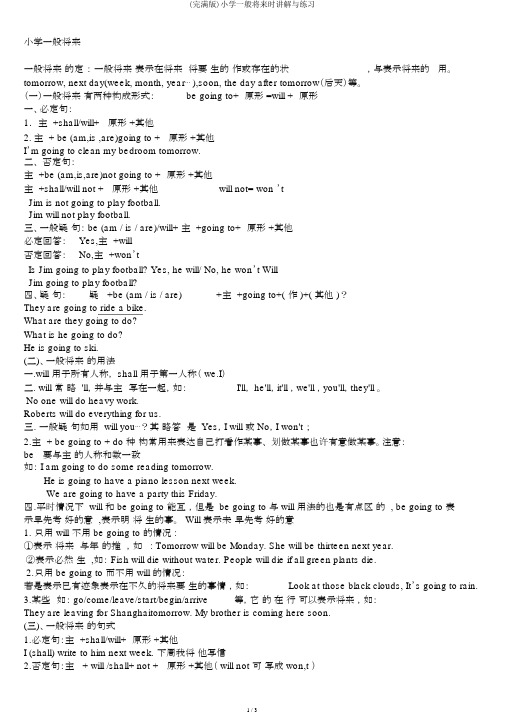
小学一般将来一般将来的定:一般将来表示在将来将要生的作或存在的状,与表示将来的用。
tomorrow, next day(week, month, year⋯ ),soon, the day after tomorrow(后天)等。
(一)一般将来有两种构成形式:be going to+原形 =will +原形一、必定句:1.主 +shall/will+ 原形 +其他2.主 + be (am,is ,are)going to + 原形 +其他I’m going to clean my bedroom tomorrow.二、否定句:主 +be (am,is,are)not going to +原形 +其他主 +shall/will not + 原形 +其他will not= won ’tJim is not going to play football.Jim will not play football.三、一般疑句: be (am / is / are)/will+ 主 +going to+原形 +其他必定回答:Yes,主 +will否定回答:No,主 +won’tIs Jim going to play football? Yes, he will/ No, he won’t WillJim going to play football?四、疑句:疑+be (am / is / are)+主 +going to+(作 )+( 其他 )?They are going to ride a bike.What are they going to do?What is he going to do?He is going to ski.(二)、一般将来的用法一.will 用于所有人称, shall 用于第一人称( we.I)二. will 常略 'll,并与主写在一起,如:I'll, he'll,it'll ,we'll ,you'll,they'll 。
一般将来时讲解+练习题
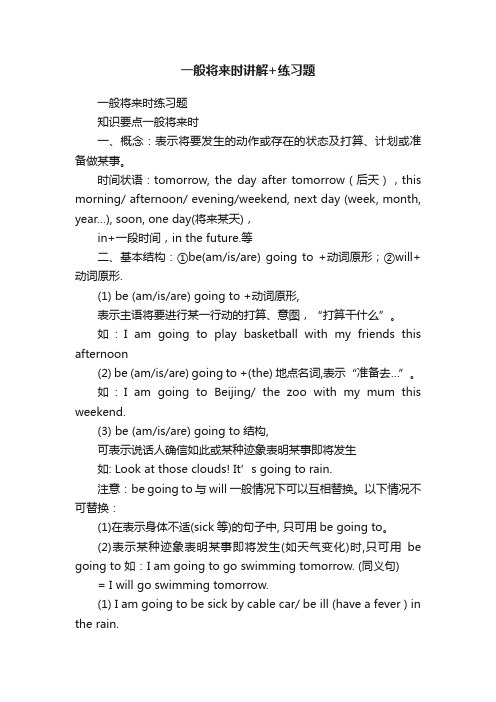
一般将来时讲解+练习题一般将来时练习题知识要点一般将来时一、概念:表示将要发生的动作或存在的状态及打算、计划或准备做某事。
时间状语:tomorrow, the day after tomorrow(后天),this morning/ afternoon/ evening/weekend, next day (week, month, year…), soon, one day(将来某天),in+一段时间,in the future.等二、基本结构:①be(am/is/are) going to +动词原形;②will+ 动词原形.(1) be (am/is/are) going to +动词原形,表示主语将要进行某一行动的打算、意图,“打算干什么”。
如:I am going to play basketball with my friends this afternoon(2) be (am/is/are) going to +(the) 地点名词,表示“准备去…”。
如:I am going to Beijing/ the zoo with my mum this weekend.(3) be (am/is/are) going to 结构,可表示说话人确信如此或某种迹象表明某事即将发生如: Look at those clouds! It’s going to rain.注意:be going to 与will一般情况下可以互相替换。
以下情况不可替换:(1)在表示身体不适(sick等)的句子中, 只可用be going to。
(2)表示某种迹象表明某事即将发生(如天气变化)时,只可用be going to 如:I am going to go swimming tomorrow. (同义句) = I will go swimming tomorrow.(1) I am going to be sick by cable car/ be ill (have a fever ) in the rain.(2) Look at those clouds! It’s going to rain.三、一般将来时的句型变化:1.肯定句:主语+ be(am/is/are) going to +动词原形或主语+ will + 动词原形. +动词原形否定句: (1)在be动词(am, is, are)后加not (2)情态动词will后加not成won’t. Eg:I’m going to have a picnic this afternoon.→ I’m not going to…..I will have a picnic this afternoon. → I will not (won’t) …2.2.一般疑问句:一调二改三问号(1)be或will调到句首(2)第一二人称互换:I/we – you;and改为or(否定与疑问句);some改为any;例如:We are going to buy some food and fruit this weekend. 或We will buy some…Are you going to buy any food or fruit this weekend? 或Will you buy any…? 3.特殊疑问句:who, what, where, when, how等特殊疑问词。
【一般将来时】全国通用(含答案及详细解析)
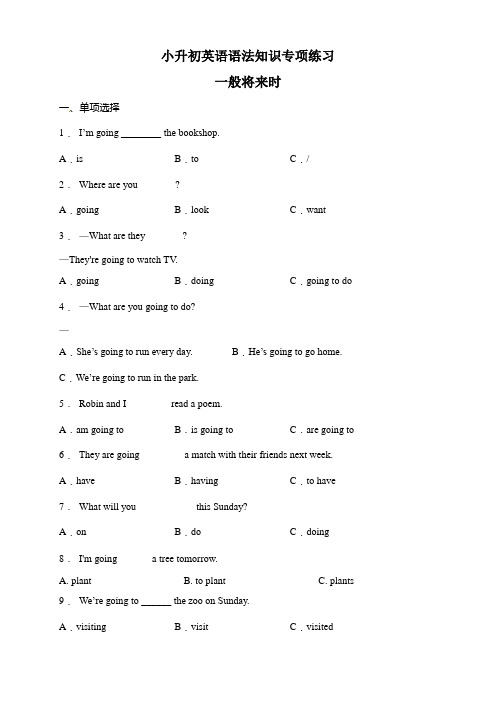
小升初英语语法知识专项练习一般将来时一、单项选择1.I’m going ________ the bookshop.A.is B.to C./ 2.Where are you _______?A.going B.look C.want 3.—What are they _______?—They're going to watch TV.A.going B.doing C.going to do 4.—What are you going to do?—________A.She’s going to run every day.B.He’s going to go home. C.We’re going to run in the park.5.Robin and I ________ read a poem.A.am going to B.is going to C.are going to 6.They are going ________ a match with their friends next week. A.have B.having C.to have 7.What will you ___________ this Sunday?A.on B.do C.doing8.I'm going ______ a tree tomorrow.A. plantB. to plantC. plants 9.We’re going to ______ the zoo on Sunday.A.visiting B.visit C.visited10.There __________ a sports meeting in the playground next Monday.A. is going to haveB. will haveC. is going to be 11.If you _________ work hard, you _________ pass the exam.A. won't, won'tB. won't, can'tC. don't, don'tD. don't, won't 12.What are you ________ to do this afternoon?A.going B.go C.goes 13.Daming and Si mon ____ to America next year.A. goesB. aregoing C. went D. go14.We are going _______.A.seeing ducks B.to see ducks C.to see duck 15.We ______have a football match tomorrow.A. are goingB. are go toC. are going to 16.—______ are they going to____ tomorrow?—They are going to have a party.A.When; doB.What; goC.What; do17.________ you pick peaches?A.Will B.Are C.Is18.—What are you going to do on Saturday?—________A.I’m going to see my grandparents.B.I see my grandparents. 19.Xiaoyong is going to ________ in the park.A.running B.run C.runs20.Mary is going to check her email ________.21.What are you ________ to buy this afternoon?A.going B.go C.goes22.I _______ buy a new hat.A.be going to B.going to C.am going D.am going to 23.I’m ________ the bookstore this afternoon ________ bus.A.going; by B.going; by a C.going to; by D.go to; in a 24.My family _______ going to get together this evening.A.are B.will C.am25.I'm going to buy a comic book ________.A.on Sundays B.next week C.yesterday 26.The friend s in Grade 6 _______ going to say goodbye.A.is B.are C.will27.I’m _________ to bring back some sausages for you!A.going B.goes C.go28.She is going to take a trip ________.A.next week B.yesterday C.last Friday 29.What ________ you ________ to do this afternoon?A.are; going B.do; do C.about; go 30.—When are you going to the Summer Palace?—________A.Three days ago. B.This afternoon. C.Every Sunday. D.Last year. 31.I am _______ eat breakfast at 7:15.A.going to B.will C.to D.for32.I _____ the Great Wall next year.A.go to visit B.will visit C.visited33.—Where are you going this afternoon?—________.A.I'm doing my homework B.I'm going to the bookstoreC.I'm going there by bike34.—Where is Tom going?—He ______ the shop.A.is going B.is going to C.is go to35.—_______ be hot?—Yes, _______.A.W ill; is it B.Will it; it will C.Will; it won't D.Will it; it is 36.Jill ________ wear glasses in the future.A.won’t B.doesn’t C.isn’t37.In the future, the computers ________ us see dinosaurs in class.A.help B.helped C.will help D.to help38.The Chinese space station ________ ready in 2022.A.will be B.gets39.I’m going to swim ______.A.now B.yesterday C.tomorrow40.________ you going to run?A.Are B.Is C.Do41.—________ are you going to do?—I’m going to swim.A.Who B.What C.Where42.—What's the weather _______ like in Xi'an?—It will be snowy.A.is going to be B.go to be C.going to be43.They will _______ the dining room.A.decorating B.decorates C.decorate44.How are you ________ celebrate?A.go to B.going to C.will to D./45.— your father you to the park tomorrow?—Yes, tomorrow is Sunday.A. Do, takeB. Did, takeC. Will, take46.We’re going ________ visit them.A.to B.too C.two47.—What are you going to do this afternoon?—________.A.I'm going to buy a book B.I'm a student C.I'm going to school by bike 48.—Where are you going this afternoon?—________A.I’m going to buy some books.B.I’m going to the bookstore.C.Can I help you? D.I’m going to visit my aunt.49.It will ______ in Beijing.A.be sunny B.sun C.sunning50.—Where ______ you ______?—I am going home.A.are; go B.are; going C.are; do一般将来时(参考答案)一、单项选择1.【答案】B【解析】句意:我将要去书店。
英语中一般将来时的总结与练习题

英语中一般将来时的总结与练习题一、一般将来时的总结1. 一般将来时的定义一般将来时表示将来某个时间要发生的动作或存在的状态,也常用于表示将来一段时间内的经常性动作或状态。
在英语中,一般将来时主要由助动词“will”或“shall”(第一人称)加动词原形构成。
此外,“be going to + 动词原形”也可表示将来时,常用于根据目前已知的情况预测未来即将发生的动作或状态。
2. 一般将来时的常见形式•“will + 动词原形”•“shall + 动词原形”(第一人称)•“be going to + 动词原形”•“be to do”结构(表示按计划或安排即将发生的动作)•“be about to + 动词原形”(表示即将发生的动作,不能与表示将来的时间状语连用)3. 一般将来时的用法•表示将来的动作或状态,通常与表示将来的时间状语连用,如“tomorrow”, “next year”, “in the future”等。
•表示根据现有情况推测未来可能发生的动作或状态,常用于“be going to”结构中。
•表示计划、安排或打算做的事情,常与“be to do”结构连用。
4. 与其他时态的区别•与现在进行时区别:现在进行时表示正在进行的动作,而一般将来时表示将来某个时间要发生的动作。
•与现在完成时区别:现在完成时表示过去发生的动作对现在造成的影响或结果,而一般将来时则表示未来即将发生的动作。
二、一般将来时的练习题1. 选择题(1) —_____ you _____ a party next weekend?—Yes, we will.A. Will; haveB. Are; havingC. Do; haveD. Are; go to have(2) They _____ a meeting this afternoon.A. are havingB. are going to haveC. will havingD. will have(3) —_____ you _____ your homework before you watch TV?—Yes, I _____.A. Will; do; willB. Are; doing; amC. Are; going to do; amD. Will; do; am2. 填空题(1) I _____ (meet) my friend at the airport tomorrow.(2) They _____ (not go) to the zoo if it rains.(3) We _____ (have) a picnic next Sunday. Will you join us?3. 翻译题(1) 明天我要去看望我的祖父母。
- 1、下载文档前请自行甄别文档内容的完整性,平台不提供额外的编辑、内容补充、找答案等附加服务。
- 2、"仅部分预览"的文档,不可在线预览部分如存在完整性等问题,可反馈申请退款(可完整预览的文档不适用该条件!)。
- 3、如文档侵犯您的权益,请联系客服反馈,我们会尽快为您处理(人工客服工作时间:9:00-18:30)。
Ⅰ一般将来时的小学阶段的基础知识
1、关键词:tomorrow, next day(week, month, year…),soon, this weekend, tonight,
the day after tomorrow(后天),in a few days, in+将来的年份或月份。
2、定义:表示在将来时间将要发生的动作或存在的状态(也就是说事情还没
做)。
3、一般将来时结构之一
will do表示将要做某事
a. 肯定句:主语+will+动词原形+其他。
注意以下缩写形式:I’ll=I will you’ll=you will he’ll=he will she’ll=she will it’ll=it will we’ll=we will they’ll=they will
例如:We (come)to see you the day after tomorrow.
There (be )a wonderful show next week.
;
b.否定句:主语+will not(won’t)+动词原形+其他。
所以含有will的肯定句变否定句方法:在will后加not,其余不变,碰到some变any。
(1)I will call you this evening.
(改为否定句)
(2)Students will use computers to learn in the future(将来).
(改为否定句)
(3)There will be a football game tomorrow afternoon.
(改为否定句)
)
c.一般疑问句:Will+主语+动词原形+其他所以含有will的肯定句变一般疑问句方法:把will提到句子开头并变成大写字母,其余照抄,记得句号要变问号。
但是注意碰到some变any,碰到my、our要变your,碰到I、we要变you。
(1)I will call you this evening.
(改为一般疑问句)
(2)Students will use computers to learn in the future(将来).
(改为一般疑问句)
(3)There will be a football game tomorrow afternoon.
(改为一般疑问句)
<
4、一般将来时结构之二
be going to do表示计划或打算做某事
a. 肯定句:主语+be going to+动词原形+其他。
例如:I (get)up at 6:30 tomorrow.
My family (have a picnic) this weekend.
She (listen) to music after school.
b. 否定句:主语+be not +going to+动词原形+其他。
所以含有be的肯定句变否定句方法:在be动词后加not,其余不变,碰到some变any。
、
(1)I am going to do some reading tomorrow.
(改为否定句)
(2)She is going to listen to music after school.
(改为否定句)
(3)My father and mother are going to see a play the day after tomorrow.
(改为否定句)
c.一般疑问句:Be+主语+going to+动词原形+其他所以含有be动词的肯定句变一般疑问句方法:把提到句子开头并变成大写字母,其余照抄,记得句号要变问号。
但是注意碰到some变any,碰到my、our要变your,碰到I、we要变you。
~
(1)I am going to do some reading tomorrow.
(改为一般疑问句)
(2)She is going to listen to music after school.
(改为一般疑问句)
(3)My father and mother are going to see a play the day after tomorrow.
(改为一般疑问句)
Ⅱ一般将来时的拓展知识(初中)
1、$
2、当主语是I或we时,一般使用shall表示将要。
例如:We shall meet at three o’clock tomorrow afternoon.
2. be going to 后面若跟的是以go 开头的动词词组,可以省略to go , 如:I’m going to go shopping. 可以写成:I’m going shopping.
3、一般将来时will do句型和be going to do句型的区别
在初中阶段来讲,“be going to+动词原形”表示一个事先考虑好的意图,相当于“打算、计划、准备”,而will则表示客观性的将来,与人的主观愿望或判断无关;或者是说话时临时做出的决定。
课堂练习(基础篇)
—
一、用所给词的正确形式填空。
1. Tomorrow morning, Bill _____________(go) to have his first class.
2. She_____ ( fly) to Beijing next Sunday for her holiday.
3. Next year Wang Lin ______________( be) sixteen.
4. He ______________ (be) a pilot next year.
5. Mary ______________(play) the violin this weekend.
二、按要求改写句子
?
1. We will meet at the bus stop at 10:30.
(改为否定句
(改为一般疑问句)
(作肯定及否定回答)
2. I’m going to see a film next Sunday.
(改为否定句
(改为一般疑问句)
【
(作肯定及否定回答)
提高篇
()1--- Kate is in hospital.
--- Yes, I know. I ____ see her this afternoon.
A will
B be going to
C am going to
D will be
()2 The sun at 6:00 tomorrow morning.
A will rise
B rises
C is going to rise
D shall rise
(
课后作业(基础篇)
一、用所给词的适当形式填空
1. Nancy ( play ) the piano at the concert next week.
2. Rose and I (take) part in a singing contest tomorrow.
3. Ron’s birthday(come).
4. Tomorrow is my uncle’s birt hday. I ( give) him a present.
5. Su Yang’s father(go)to France next week.
¥
二、按要求改写句型
1. He is going to do his homework after school.
(改为否定句
(改为一般疑问句)
(作肯定及否定回答)
2. I will meet Helen at the school gate at 8:30.
(改为否定句
(
(改为一般疑问句)
(作肯定及否定回答)
提高篇
1()— Where is the morning paper —I ______ it for you at once.
A. get
B. am getting
C. to get
D. will get
2( )There _______ a football match tonight.
A. were
B. are
C. was
D. will be
3( ) Look at those black clouds, it _____ rain.
A. will
B. is going to
C. would
4( ) We hope Mary ______ to us as soon as she reaches London.
A. write
B. to write
C. will write
D. writes。
